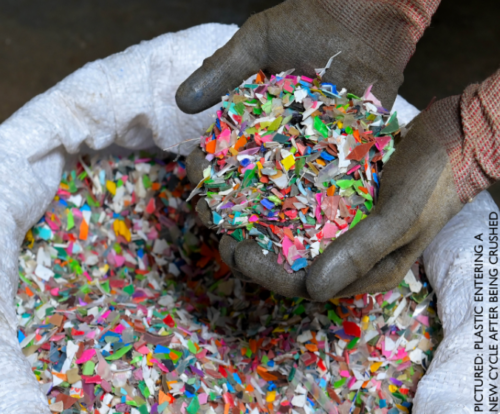USAID Ocean Plastics Reduction Activity Fact Sheet

The USAID Ocean Plastics Reduction Activity (Ocean Plastics Reduction) is a five-year project to reduce environmental plastics by decreasing plastic inputs and improving integrated solid waste management (SWM) practices in Sri Lanka and Maldives.
With a focus on ocean plastics pollution, USAID Ocean Plastics Reduction will mobilize funding for SWM and 3R (reduce, reuse, and recycle) activities and improve government capacity to manage the industry. The project’s diverse consortium, led by RTI International, will use a systems strengthening approach, working alongside local partners to target system inefficiencies and areas of reliance on virgin plastics, with the goal of increasing participation in SWM/3R programs and preventing thousands of tons of plastic from leaking into the environment.
Reducing Reliance on Virgin Plastic Inputs and Products
Reducing import and use of virgin plastics is the crucial first step. USAID Ocean Plastics Reduction will analyze supply chains and regulatory environments identifying opportunities for, and potential barriers to, reduction. The project will promote product and process alternatives to plastic inputs and support extended producer responsibility, polluter pay principles, and other approaches that reduce plastic inputs. These efforts will work to decrease the volume of imported single use plastics and increase the prevalence of 3R behaviors at household, community, and private sector levels.
Professionalizing, Improving, and Expanding SWM, with a Focus on Reducing Environmental Plastics
Waste management services vary in Sri Lanka and the Maldives, and rely on local informal actors for the collection, transport, segregation, recycling, and disposal of solid waste. In partnership with the government and private sector, USAID Ocean Plastics Reduction will strengthen service delivery models, professionalizing every step of the waste disposal process, all while promoting public and private buy-in for SWM. With solid waste collection representing a substantial part of local governments’ budgets, the project will raise additional funding through efficiency interventions and partnerships with multilateral agencies, foundations, and/or impact investors. These actions will decrease the volume of solid waste in the environment and improve local access to reliable and SWM services.
Empowering Communities to Drive Local Solutions
The most important actors in improving waste management are often the least represented in decision-making—informal sector workers are the foundation of the waste management pyramid, yet they struggle to obtain support, even for safe working conditions. Women are vulnerable to gender-based violence and seldom placed in positions of power. Understanding how crucial these marginalized actors are, USAID Ocean Plastics Reduction will support independent waste collectors and women-owned recycling businesses. Surpassing community consultation in favor of community empowerment, the project will support locally led SWM initiatives, businesses, and services, encouraging communities to work with government to identify opportunities for 3R activities and implement effective containment, collection, segregation, and recycling approaches to increase community ownership of the SWM process and promote positive social and behavior changes surrounding SWM. Collectively, these efforts will help reduce community waste and increase management practices that support the 3R principles.
Strengthening the Enabling Environment for SWM
Understanding that the SWM-enabling environment will be crucial, USAID Ocean Plastics Reduction will strengthen the government’s ability to manage SWM and improve solid waste data collection, with a focus on increasing local capacity to prevent and/or respond to the solid waste-related impacts of disasters. Working with local, regional, and national governmental bodies, the project will promote policy priorities that improve governance of SWM approaches. Prioritizing local capacity building, this work will strengthen partnerships with public and private entities to reinforce existing systems, increasing resilience in the face of disasters. These efforts will strengthen government SWM policies and increase the availability of crucial data, as well as increasing local capacity to cope with the potential solid waste related impacts of disasters.

